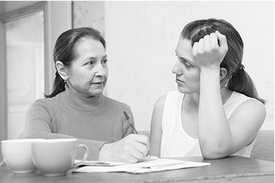Preparing for the Death of a Loved One
| This information applies to British Columbia, Canada. Last reviewed for legal accuracy by Helen Low, QC and Nicco Bautista in January 2017. |
The anticipated death of a loved one is a difficult time. Here are some practical steps to help prepare everyone for what lies ahead.
The No CPR Form
Some people approaching the natural end of their lives or suffering from a life-limiting illness decide to not have cardiopulmonary resuscitation (CPR) or other emergency medical procedures provided if their heart or lungs stop. This decision can be recorded in a “No CPR Form”. This form is a medical order that says the person has had a conversation with a healthcare professional about CPR. It tells people such as first responders, paramedics and care providers not to start CPR on behalf of the person whether they are at home, in the community or in a care facility.
The No CPR Form is available online or from a healthcare professional’s office. For the No CPR Form to be valid, it must be signed by a consenting adult (either the person approaching end of life or their substitute decision maker), and their doctor or nurse practitioner.
Put the signed No CPR Form on the fridge at home so it can be easily seen. When away from home, carry the form so it’s available should it be needed.
 |
With a signed No CPR Form, you can get a free MedicAlert® bracelet with “No CPR” engraved on it. To obtain a free bracelet, call 1-800-668-1507 or visit the MedicAlert® website. |
Making arrangements with a funeral home
Making arrangements in advance with a funeral home helps loved ones deal with the body and arrange the funeral after death.
 |
For information on funeral homes in your area, contact the BC Funeral Association at www.bcfunerals.com or 1-800-665-3899. |
Once a funeral home is selected, a form called "Notification of Expected Death in the Home" can be completed. This form authorizes the funeral home to remove the body from the home without “pronouncement of death” by a healthcare professional. For more details, see the section “Pronouncement of death”.
The notification form is available online. It is completed by the doctor of the person approaching end of life and sent to the funeral home before the death.
Organ and tissue donation
Organ donations can help save the lives of others. A person approaching end of life, if they haven’t already done so, can register as a donor with the BC Organ Donor Registry administered by BC Transplant.
You can choose what organs and tissues to offer for donation. Or you can choose to donate any organs that are needed. You can also choose to donate for transplant, for research, or for educational purposes.
You don’t have to be perfectly healthy to donate an organ. It’s the health of a certain organ that matters. Talk with your doctor or contact BC Transplant if you have questions.

Preparing a written plan
If the person approaching end of life makes a short written plan, it helps family, friends and others respect their wishes and know what to do at the time of death.
The written plan should include:
- Medical contacts: How the family doctor or nurse practitioner can be reached, and who to contact if they are unavailable or cannot be reached.
- Pronouncing death: Who will pronounce death, if pronouncement is planned.
- Emotional support: Who should be called for emotional support.
- Funeral home: Which funeral home will be called to transport the body.
| ||||||||||||||||||||

